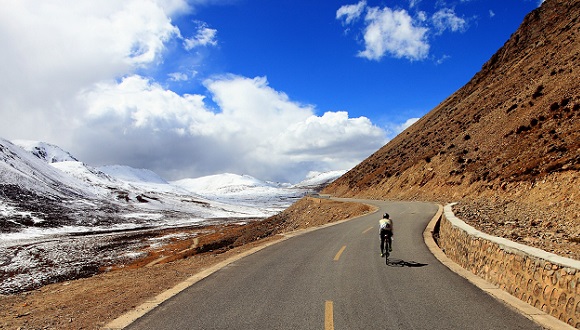Following the cyclists who were participating the VAGUE-318 Tibet Challenge, I was deeply moved and also encountered with many ideas. When I was about to search the information with my mobile phone, I came across with a sentence "(as long as) the e-bike blooms, China can be a powerhouse of bicycles".
According to the latest statistics by Chinese bicycle association, China exported 83.05 million bicycles, which were valued at over US$3.5 billion. This means China is a unique Kingdom of bicycles in terms of production, sales or inventories of bikes.
But I’ve been haunted by the feeling that "exportation is the best way to release the production capacity and to push enterprises to change and reform" which is often said by people in bicycle industry. It ought to be put in this way that “Developing cycling (or other related sports such as Triathlon) is the best way to push companies to change and reform”.
Accordingly, three hypotheses occur to me.
No.1: when will we have cycling teams full of Chinese elements?
Top global road cycling events led by Tour de France or Giro d'Italia have seen the involvement of Chinese cyclist Ji Cheng or Chinese Giant Team. However, I think this is far from enough. In my perspective, there ought to be cycling teams with Chinese players as core forces (at least one of them) alongside sponsors from domestic brands and with made-in-China equipment participating in all these top competitions.
In this perspective, Chinese corporations have a well-deserved example, which is the Astana despite the scandals. Thanks to the joint force by some big state-owned enterprises, the cycling team from Kazakhstan have impressed both in Tour de France and the Olympic Games, making the capital city Astana more famous to the rest of the world. Therefore, the Chinese commercial tycoons who merely spend big in soccer, compared to those based in Kazakhstan, are inevitably “out of fashion”.
No.2: when will the cycling heroes become public idols and ambassador of Chinese bicycle brand?
Generally Chinese bicycle manufactures focus more on overseas markets than the domestic one and the out-of-date presence of cycling in China has discourage these brands to get into the sport. But I have a feeling that “the right way for the bicycle industry in China (to bloom) is to establish cycling stars and star cycling teams” after the experience in the Tibet Challenge. They don’t necessarily to be an Olympic champion but they could be a hero like Liu Xing Yu who impressed in the Challenge.
Having mentioned the Olympic Games, I want to repeat one of my arguments that I made before the 2012 London Olympic Games regarding cycling that cycling is a Top 3 sport following athletics and swimming. It deserves more attentions from the media.
No.3: When will we see cyclist, runners and simmers bloom in their own way?
In the globe, cycling alongside jogging and swimming are those sports that attract mass participants. If a promising ecology system is to be built for mass sports, these sports mentioned above ought to bloom individually. As part of the opportunities, China is on the verge to see thousands of million bicycles, most of which are ride-instead-of-walk, to be replaced by sports bicycles and racing bikes.
These hypotheses may not exist any longer as China has seen exportation of high-end bicycles significantly increase, the racing bikes (128%) particularly.
Having a world like this, how will China react?
This article is wrote by our columnist Fang Xuefeng who is a senior TV reporter and Chief strategist at CCTV 5. Mr Fang is renowned as a walking dictionary of Chinese sports.
